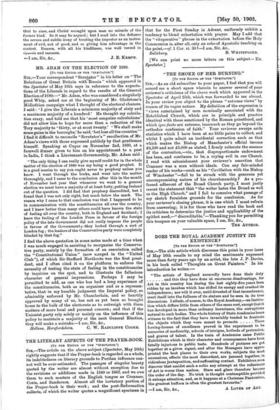DOES THE ROYAL ACADEMY JUSTIFY ITS EXISTENCE ?
[To THB EDITOR OF THE " SPECTITOR.1
SIR,—The able article which discusses this point in your issue of May 16th recalls to my mind the sentiments expressed more than forty years ago by an artist, the late J. P. Davies, in his book called " Thoughts on Great Painters." In his introduction he writes :—
" The artists of England assuredly have done their duty and this they have done at enormous disadvantage, for Art in this country has during the last eighty-five years been ridden by an incubus which has stifled its energy and crushed its independence ; nor will it ever, until divested of that incumbrance, erect itself into the fullness of its stature and be seen in its true dimensions. I allude, of course, to the Royal Academy,—an Institu- tion which differs little from others of the same sort, except that it has developed in more than ordinary luxuriance, the corruptions natural to such bodies. The whole history of State Academies bears witness to the fact that they have invariably tended to frustrate the objects which they were meant to promote These forcing-houses of excellence proved in the experiment to be nurseries of mediocrity, schools of intrigue, hotbeds of pretension, and graves of talent. In the train of Academies came Public, Exhibitions which in their character and consequences have been fatally injurious to public taste. Hundreds of pictures are got together at a given signal, and after the Managers have appro- priated the best places to their own works, subjects the most anomalous, effects the most discordant, are jammed together, in ridiculous juxtaposition, and suffocating contact. Exhibitors soon discover that amidst such a melee any attempt at the refinement of Art is worse than useless. Stare and glare therefore become the order of the day. No trick is thought contemptible provided it entraps attention, and, as it happens at a Chrismas Pantomime, the greatest buffoon is often the greatest favourite."






































 Previous page
Previous page